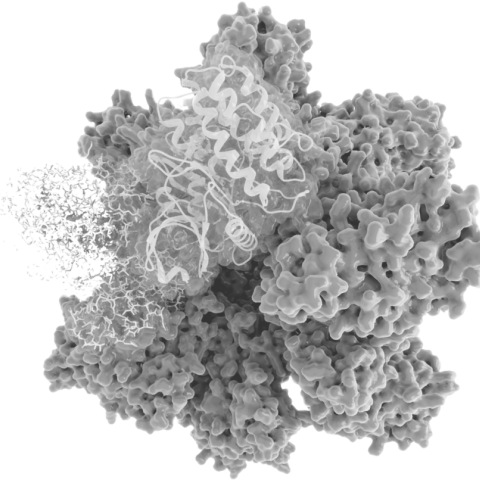
Ripretinib is an orally administered switch-control kinase inhibitor engineered using our proprietary drug discovery platform and developed for the treatment of gastrointestinal stromal tumor, or GIST. While approved kinase inhibitors control certain initiating and drug resistance-causing mutations in KIT and PDGFRA, the kinases that drive disease progression in most GIST patients, these approved drugs fail to inhibit all known mutations. We designed ripretinib to improve the treatment of GIST patients by inhibiting the full spectrum of the known mutations in KIT and PDGFRA. Ripretinib is a KIT and PDGFRA switch-control kinase inhibitor that blocks initiating and resistance KIT mutations in exons 9, 11, 13, 14, 17, and 18 known to be present in GIST patients. QINLOCK similarly inhibits the primary initiating PDGFRA mutations occurring in exons 12 and 18 and also inhibits wild-type PDGFRA that is subject to amplification in cancers. We are focused on exploring the full potential of ripretinib to benefit people with GIST.
-
Changing the Treatment of GIST
GIST is a cancer affecting the digestive tract or nearby structures within the abdomen, most often presenting in the stomach or small intestine. GIST is the most common sarcoma of the gastrointestinal tract, with approximately 4,000 to 6,000 new GIST cases each year in the United States and a similar incidence rate in European countries. Estimates for 5-year survival range from 52% to 94%, depending upon the stage of the disease at diagnosis.
Most cases of GIST are driven by a spectrum of mutations. The most common primary mutations are in KIT kinase, representing approximately 80% of cases, or in PDGFRA kinase, representing approximately 5% to 10% of cases. Current therapies are unable to inhibit the full spectrum of primary and secondary mutations, which drive resistance and disease progression.
-
Ripretinib in ≥4ᵗʰ Line GIST
QINLOCK® (ripretinib) is approved by the U.S. FDA for the treatment of adult patients with advanced GIST who have received prior treatment with 3 or more kinase inhibitors, including imatinib. Our new drug application (NDA) was based on positive results from our Phase 3 study, INVICTUS, in patients with fourth-line and fourth-line plus GIST. QINLOCK is also approved for the treatment of fourth-line GIST in Australia, Canada, China, the European Union, Hong Kong, Iceland, Israel, Liechtenstein, Macau, New Zealand, Norway, Singapore, Switzerland, Taiwan, the United Kingdom, and the United States.
In the INVICTUS study, QINLOCK demonstrated a median progression free survival (PFS) of 6.3 months in the ripretinib arm compared to 1.0 month in the placebo arm and ripretinib significantly reduced the risk of disease progression or death by 85% (Hazard Ratio (HR) of 0.15, 95% Confidence Interval (0.09, 0.25), p-value <0.0001) compared to placebo.
For the key secondary endpoint of objective response rate (ORR) as determined by blinded independent central review (BICR) using modified Response Evaluation Criteria in Solid Tumors (RECIST), QINLOCK demonstrated an ORR of 9.4% compared with 0% for placebo (p-value=0.0504), which was not statistically significant. QINLOCK also showed a clinically meaningful improvement over placebo in terms of the secondary endpoint of overall survival (OS) (median OS 15.1 months with QINLOCK compared to 6.6 months with placebo, HR = 0.36, 95% Confidence Interval (0.21, 0.62), nominal p-value=0.0004). According to the prespecified hierarchical testing procedure of the endpoints, the hypothesis testing of OS cannot be formally conducted unless the test of ORR is statistically significant. Since statistical significance was not achieved for ORR, the hypothesis testing of OS was not formally performed. The OS data for the placebo arm includes patients randomized to placebo who, following progression, crossed-over to QINLOCK treatment.
The most common adverse reactions (≥20%) were alopecia, fatigue, nausea, abdominal pain, constipation, myalgia, diarrhea, decreased appetite, palmar-plantar erythrodysesthesia syndrome (PPES), and vomiting. The most common Grade 3 or 4 laboratory abnormalities (≥4%) were increased lipase and decreased phosphate. Adverse reactions resulting in permanent discontinuation occurred in 8% of patients, dosage interruptions due to an adverse reaction occurred in 24% of patients and dose reductions due to an adverse reaction occurred in 7% of patients who received QINLOCK. Please click here to see the full U.S. prescribing information for QINLOCK.
To learn more about QINLOCK, click here. Please see the product website and below for complete safety information and full prescribing information.
To learn more about the results from INVICTUS, click here.
-
INTRIGUE Study of QINLOCK (Ripretinib) in 2nd Line GIST Patients Previously Treated with Imatinib
INTRIGUE is a randomized, open-label, global, multicenter phase 3 study comparing the efficacy and safety of QINLOCK vs sunitinib in patients with advanced gastrointestinal stromal tumor (GIST) who had disease progression on or were intolerant to first-line treatment with imatinib. Patients were randomly assigned 1:1 to receive either QINLOCK 150 mg once daily or sunitinib 50 mg daily (4 weeks on/2 weeks off) and stratified by KIT/platelet-derived growth factor α mutation and imatinib intolerance. Overall, 453 patients were randomly assigned to ripretinib (intention-to-treat [ITT], n = 226; KIT exon 11 ITT, n = 163) or sunitinib (ITT, n = 227; KIT exon 11 ITT, n = 164). The primary endpoint was progression-free survival (PFS) by independent radiologic review using modified Response Evaluation Criteria in Solid Tumors version 1.1. QINLOCK was not superior to sunitinib in terms of PFS. However, meaningful clinical activity, fewer grade 3/4 treatment-emergent adverse events, and improved tolerability were observed with QINLOCK.
To learn more about the results from INTRIGUE, click here.
-
INSIGHT Study of QINLOCK (Ripretinib) in 2nd Line GIST Patients with Mutations in KIT Exon 11 + 17/18
Based on an exploratory ctDNA analysis from INTRIGUE, QINLOCK is also being evaluated in the INSIGHT Phase 3 clinical study, a randomized, global, multicenter, open-label study to evaluate the efficacy and safety of QINLOCK compared to sunitinib in patients with GIST previously treated with imatinib with mutations in KIT exon 11 and 17/18 (excluding patients with mutations in KIT exons 9, 13, or 14). In the study, 54 patients will be randomized 2:1 to either QINLOCK 150 mg once daily or sunitinib 50 mg once daily (4 weeks on/2 weeks off).
To learn more about this study, click here.
To learn more about the study rationale of INSIGHT, click here.
-
Related Presentations and Publications
-
U.S. Indication and Important Safety Information About QINLOCK
Indications and Usage
QINLOCK (ripretinib) is a kinase inhibitor indicated for the treatment of adult patients with advanced gastrointestinal stromal tumor (GIST) who have received prior treatment with 3 or more kinase inhibitors, including imatinib. For more information visit QINLOCK.com.
Important Safety Information
There are no contraindications for QINLOCK.
Palmar-plantar erythrodysesthesia syndrome (PPES): In INVICTUS, Grade 1-2 PPES occurred in 21% of the 85 patients who received QINLOCK. PPES led to dose discontinuation in 1.2% of patients, dose interruption in 2.4% of patients, and dose reduction in 1.2% of patients. Based on severity, withhold QINLOCK and then resume at same or reduced dose.
New Primary Cutaneous Malignancies: In INVICTUS, cutaneous squamous cell carcinoma (cuSCC) occurred in 4.7% of the 85 patients who received QINLOCK with a median time to event of 4.6 months (range 3.8 to 6 months). In the pooled safety population, cuSCC and keratoacanthoma occurred in 7% and 1.9% of 351 patients, respectively. In INVICTUS, melanoma occurred in 2.4% of the 85 patients who received QINLOCK. In the pooled safety population, melanoma occurred in 0.9% of 351 patients. Perform dermatologic evaluations when initiating QINLOCK and routinely during treatment. Manage suspicious skin lesions with excision and dermatopathologic evaluation. Continue QINLOCK at the same dose.
Hypertension: In INVICTUS, Grade 1-3 hypertension occurred in 14% of the 85 patients who received QINLOCK, including Grade 3 hypertension in 7% of patients. Do not initiate QINLOCK in patients with uncontrolled hypertension. Monitor blood pressure as clinically indicated. Based on severity, withhold QINLOCK and then resume at same or reduced dose or permanently discontinue.
Cardiac Dysfunction: In INVICTUS, cardiac failure occurred in 1.2% of the 85 patients who received QINLOCK. In the pooled safety population, cardiac dysfunction (including cardiac failure, acute left ventricular failure, diastolic dysfunction, and ventricular hypertrophy) occurred in 1.7% of 351 patients, including Grade 3 adverse reactions in 1.1% of patients.
In INVICTUS, Grade 3 decreased ejection fraction occurred in 2.6% of the 77 patients who received QINLOCK and who had a baseline and at least one post-baseline echocardiogram. Grade 3 decreased ejection fraction occurred in 3.4% of the 263 patients in the pooled safety population who received QINLOCK and who had a baseline and at least one post-baseline echocardiogram.
In INVICTUS, cardiac dysfunction led to dose discontinuation in 1.2% of the 85 patients who received QINLOCK. The safety of QINLOCK has not been assessed in patients with a baseline ejection fraction below 50%. Assess ejection fraction by echocardiogram or MUGA scan prior to initiating QINLOCK and during treatment, as clinically indicated. Permanently discontinue QINLOCK for Grade 3 or 4 left ventricular systolic dysfunction.
Risk of Impaired Wound Healing: QINLOCK has the potential to adversely affect wound healing. Withhold QINLOCK for at least 1 week prior to elective surgery. Do not administer for at least 2 weeks following major surgery and until adequate wound healing. The safety of resumption of QINLOCK after resolution of wound healing complications has not been established.
Embryo-Fetal Toxicity: QINLOCK can cause fetal harm when administered to a pregnant woman. Advise pregnant women of the potential risk to a fetus. Advise females of reproductive potential and males with female partners of reproductive potential to use effective contraception during treatment and for at least 1 week after the final dose. Because of the potential for serious adverse reactions in the breastfed child, advise women not to breastfeed during treatment and for at least 1 week after the final dose. QINLOCK may impair fertility in males of reproductive potential.
Adverse Reactions: The most common adverse reactions (greater-than or equal to 20%) were alopecia, fatigue, nausea, abdominal pain, constipation, myalgia, diarrhea, decreased appetite, PPES, and vomiting. The most common Grade 3 or 4 laboratory abnormalities (greater-than or equal to 4%) were increased lipase and decreased phosphate.
The safety and effectiveness of QINLOCK in pediatric patients have not been established.
Administer strong CYP3A inhibitors with caution. Monitor patients who are administered strong CYP3A inhibitors more frequently for adverse reactions. Avoid concomitant use with strong CYP3A inducers.
Please click here to see the full U.S. Prescribing Information for QINLOCK.

